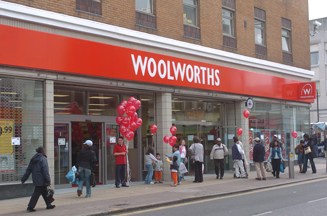
There was a time when the panic button would be hit only for a handful of unscrupulous or unlucky brands.
Now, however, with recession wringing the life out of so many renowned high-street retailers, and an attendant erosion of trust in the UK's brittle banking sector, the art of emergency marketing is becoming a hugely valuable skill.
Woolworths, the most high-profile failure of recent months, caused particular consternation due to its lack of communication. With media reports predicting the demise of the brand, its website was simply pulled and replaced with the disingenuous message: 'Our site is currently undergoing essential maintenance. We apologise for any inconvenience caused. Please check back later.'
Conversely, when entertainment retailer Zavvi became caught up in the aftermath of the demise of Woolworths, it opted for a far more open policy, stating on its website that it had 'decided to suspend taking orders for these products while [it worked] to resolve the situation'.
Zavvi has also now fallen into administration, but it is worth considering whether its actions gave it a better chance of recovery. Northern Rock, one of the first victims in the slide toward recession, also arguably helped its chances of survival with messages on its website explaining how nationalisation would affect its customers.
A head for trouble
So is there a role for marketers when things go pear-shaped? Alan Gilmour, the former UK marketing director of recently nationalised Icelandic bank Landsbanki, argues that a good marketer should try to be ready for disaster, but will often find themselves unable to react - not least because a financial crisis will put the skids on marketing budgets.
'It depends on the situation, but you should have a plan in place,' he says. 'PR is the first line of defence because you want to get your message out quickly. Online is also very important. But sometimes - take the airlines after 9/11 - you will actually have to pull your marketing.'
Mud-slinging is so common in the utilities sector that marketers are used to adopting a siege mentality. Nonetheless, Npower marketing director Kevin Peake admits it is difficult to make an instant impact with ad messages.
'The problem for marketers is that experience lags behind perception, so the job of a marketing director is to try to reinforce the experience and make the brand popular again,' he says. 'What you can do is use your ads to say, "You may have heard this about our brand, but the truth is this".'
There are plenty of examples where marketers have opted to act, however. In 2007, Mars UK took out a series of press ads to apologise to consumers over plans to use animal by-products in some of its chocolate bars.
Last year, Abbey's parent company, Santander, acquired failed banking brand Bradford & Bingley in the middle of a campaign urging consumers to 'Sleep easy'. Hardly ideal, admits Abbey marketing director Keith Moor with hindsight. The brand subsequently changed the ad to include positive messages about the takeover.
However, Susan Singleton, a solicitor at commercial law specialist Singletons, sounds a warning over knee-jerk messages. 'If details of a crisis within a company, whether that be scandal or simply running out of money, emerge, speaking before details are clear can be counter-productive,' she says. 'Most lawyers would probably stick with the old English saying, "If in doubt, say nowt".'
So it would seem marketers are damned if they do, and damned if they don't. Perhaps the best option is to at least make sure they know where the panic button is located if they do decide they need it.
Crisis timeline
2008
- 7 Feb Northern Rock is nationalised
- 21 May Discount retailer MK One enters administration
- 29 Sep Bradford & Bingley is nationalised, and Santander buys its branch network
- 7 Oct MFI enters administration
- 13 Oct The government invests £37bn in HBOS, Royal Bank of Scotland and Lloyds TSB
- 26 Nov Woolworths enters administration
- 24 Dec Zavvi enters administration
- 31 Dec Adams enters administration
2009
- 26 Jan Barratts Shoes and PriceLess Shoes enter administration
- 19 Feb JJB Sports' Original Shoe Co and Qube chains are placed into administration

